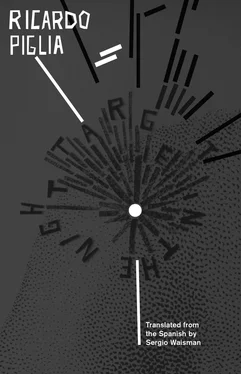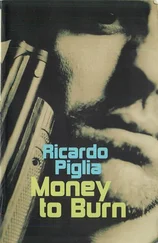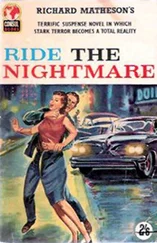The train station was quiet, the train would arrive soon. Renzi sat on the bench, under the shade of the casuarina trees. All of a sudden he saw a car pull over out in the street and Sofía get out.
“I wish I could go with you to Buenos Aires.”
“So come.”
“I can’t leave my sister,” she said.
“You can’t, or you don’t want to?”
“I can’t and I don’t want to,” she said, and stroked his face. “Come on, my little dove, don’t start trying to give me advice.”
She was never going to leave. Sofía was like all the people Renzi had met in town, they were always on the verge of leaving the countryside and running away to the city. They always said they were suffocating in the plains, but in the end they were never going to leave — and they knew it.
She was worried about Luca. She’d gone to visit him, he seemed relaxed, concentrating on his inventions and his projects, and yet he couldn’t stop going back over and over to the deal he’d made with Cueto. “It was the only thing I could do,” he told her, but he seemed withdrawn. He’d spent the whole night wandering around the factory with the strange feeling that now that he’d finally gotten what he’d always hoped for, his resolve had left him. “I can’t sleep,” he’d told her. “I’m tired all the time.”
The train arrived. In the loud commotion of the passengers getting on the train, laughing and saying their farewells, the two of them kissed and Emilio placed a gold charm with the figure of a rose engraved on it in her hand. It was a gift. She held it up to her forehead, it was the only kind of rose that didn’t wither…
When the train started, Sofía walked along the window, until she finally stopped, gorgeous in the middle of the platform, her red hair on her shoulders and a peaceful smile on her face, illuminated by the afternoon sun. Beautiful, young, unforgettable, and — in essence — another woman’s woman.
As he traveled, Renzi looked out at the countryside, at the quiet of the plains, the last houses, the men on horseback riding alongside the train. A group of kids ran along the embankment, barefoot, flashing obscene gestures at the travelers. Renzi was tired, the monotonous jolting of the train made him sleepy. He remembered the beginning of a novel (it wasn’t the beginning, but it could’ve been the beginning): “Who loved not his sister’s body but some concept of Compson honor.” And he started translating: Quien no amaba el cuerpo de su hermana sino cierto concepto de honor …But he stopped and rewrote the line. Quien no amaba el cuerpo de su hermana sino cierta imagen de sí misma : “Who loved not his sister’s body but some concept of herself.” He fell asleep and heard confusing words. He saw the figure of a large wooden bird in the country with a caterpillar on its beak. Was there such a thing as incest between sisters? He saw the shop window of a gunsmith. His mother wearing a parka on a freezing street in Ontario. And if it had been one of them? Sitting on his foldout bed in the asylum, Croce had asked him: “How tall are you?” And: “There’s an obvious solution, and a false solution, and finally a third solution,” Croce had said. Renzi woke up, startled. The pampas were still the same, endless and gray. He’d dreamt about Croce and also — his mother? There was snow in the dream. As the afternoon grew darker, the reflection of Emilio’s face on the train’s window became more and more clear.
The town remained the same as always. In May, with the first low temperatures of fall, the streets seemed less hospitable, the dust swirled about on the corners, and the sky was bright, livid, as if it were made of glass. Nothing moved. The children weren’t heard playing, the women didn’t come out of their houses, the men smoked in the doorways, and the only sound that could be heard was the monotonous whirring of the station’s water tank. The fields were dry, so they started burning off parts of the pastures, the workers advanced in a line burning the weeds and the cuttings, tall waves of fire and smoke rose above the empty plains. Everyone seemed to be waiting for some kind of sign, the confirmation of one of those dark predictions sometimes announced by the old folk healer who lived alone in a shack on a hill. The gardener walked by at dawn, his cart filled with horse manure from the nearby army encampment; the girls strolled aimlessly through the square, sick with boredom; the young men played pool in the Náutico bar, or set up drag races on the road to the lake. The news from the factory was contradictory. Many said that activity in those weeks seemed to have picked up again, and that the lights in the plant’s garage were on all night long. Luca had started dictating a series of measures and regulations to Schultz for a report he intended to send to the World Bank and to the Argentine Industrial Union. He stayed up through the night walking the upper galleries of the factory, followed by his secretary Schultz.
“I have lived, attempted, and achieved so much that they had to carry out a certain violent chain of events to separate and distance me from my accomplishments. We were caught in a trap, through a series of tricks and ruses, not by doubt, but by certainty” (Dictated to Schultz).
“To attribute to the means of industrial production a pernicious action about effects is to recognize in them a moral potential. Do economic actions not create, in fact, a structure of feelings built on reactions and emotions? There is an economic sexuality that exceeds the conjugal norms needed for natural reproduction” (Dictated to Schultz).
“Men have always been used as mechanical instruments. In the old days, in the harvest season, farm workers used to sew steadily, using bale needles to close up the burlap sacks. They were incredibly fast at their sewing, they could produce more than thirty or thirty-five sacks per hectare. Once in a blue moon they’d have to scoop one of the laborers out of the platform. In the rush, he’d have sewn in the tip of his shirt and he’d be stuck to a sack. He’d be rolling on the ground like a fallen brother” (Dictated to Schultz).
“I’ve been thinking about the local weaving. String, knot, string, cross and knot, red, green, string and knot, string and knot. My grandmother Clara learned to knit the blankets they weave in the pampas, her fingers deformed from arthritis, they were like hooks or vine shoots — but with her fingernails painted! Very elegant. We recall Martin Fierro’s sentence: every gaucho you see / a tapestry of misfortunes . The mechanical spinning and weaving of fate! The local weaving penetrates to the marrow. Somewhere someone weaves, and we live woven, flowered in the weave, plotted in the plot. If I could go back even for an instant to the workshop with all the tapestries. The vision lasts only a second, then I fall into the brutal dream of reality. I have so many terrifying things to tell” (Dictated to Schultz).
“I’ve confirmed several times that my intelligence is like a diamond that can pierce pure glass. Economic, geographic, climactic, historical, social, and family determinations can, in very extraordinary occasions, be concentrated and embodied in a single individual. Such is my case” (Dictated to Schultz).
Schultz would get lost at times, he couldn’t follow Luca’s pace, he wrote what he thought he heard. 42Luca marched in long strides through the facilities, talking nonstop, he didn’t want to be alone with his thoughts. He asked Schultz to write all his ideas down as he walked nervously from one end to the other, across the garage of the plant, by the large machines. Sometimes Rocha would follow him instead, he’d sub in for Schultz while the ex-seminary student slept on a cot, they took turns taking dictation.
Читать дальше












